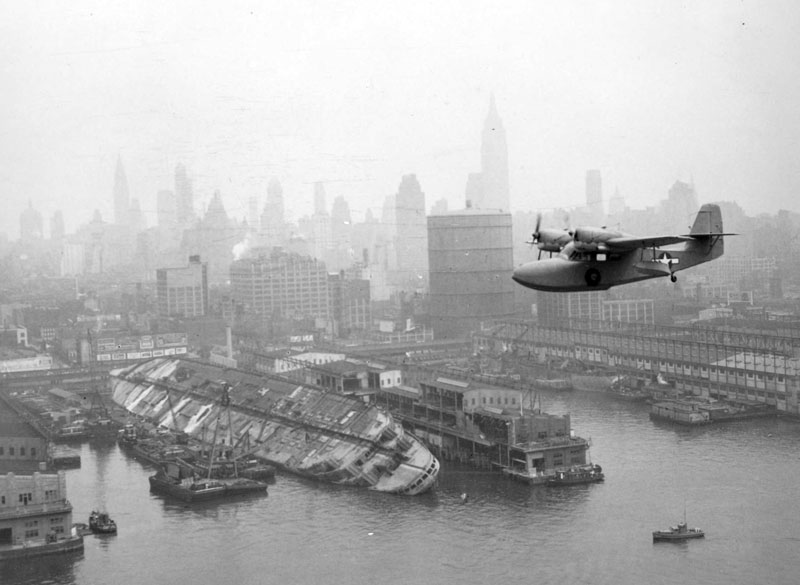CIC Port Security Course Established in Baltimore (11 OCT 1943)
By Erin E. Thompson, USAICoE Staff Historian
October 6, 2022

French ship SS Normandie (renamed USS Lafayette) sank at the New York Port of Embarkation in February 1942. Although proven to be an accident, rumors of sabotage of ships at port highlighted the need for trained investigators at important ports of entry during World War II.
11 OCTOBER 1943
On 11 October 1943, the Counter Intelligence Corps (CIC) training school in Maryland introduced a new field security module focused on port security. With the assistance of the U.S. Port Authority at Baltimore, CIC personnel would learn and implement important port security measures during World War II.
The attack on Pearl Harbor in December 1941 necessitated a U.S. government response to national security, including expanding the port security duties of the military, especially as thousands of troops began embarking for Europe and the Pacific Islands out of the busiest ports in the country. The burden of port security initially fell to the U.S. Transportation Corps and various service commands from the Federal Bureau of Investigation, Office of Naval Intelligence (ONI), and U.S. Coast Guard. As the Transportation Corps became overwhelmed, many port commanders took over this responsibility, hiring lawyers, detectives, insurance investigators, and newspaper reporters to serve as investigators. In April 1942, these investigators were issued Military Intelligence Division (MID) credentials, though they remained under the auspices of the Transportation Corps.
During the early years of U.S. involvement in the war, port security became an important aspect of CIC work in the North Atlantic. Around August 1942, the MID began providing CIC linguists to ONI to support checks on neutral European vessels. Meanwhile, the MID determined security measures against enemy agents or attacks on U.S. and Allied ports of entry required specialized focus, especially as fears of enemy sabotage increased after America entered the war. This required the CIC training school in Maryland to produce a comprehensive training course, outside the standard one-hour overview of port security duties provided by regular intelligence classes, to prepare agents for the undertaking.
On 11 October 1943, the Military Intelligence Training Center (MITC) at Camp Ritchie, Maryland, launched a one-week port security course with the assistance of the U.S. Coast Guard in Baltimore. Throughout the course, agents learned about security procedures, guard duties, ship searches, harbor patrols, supervision of cargo loading and unloading, dock dispersion, and passenger and crew control. By January 1944, approximately 725 CIC officers and enlisted men had completed the program, with hundreds more following them over the next few years.
Between 1943 and the end of the war, CIC detachments assigned to the Transportation Corps provided valuable support to ports across six continents. CIC detachments were tasked with meeting incoming ships and performing inspections of the crews to determine whether they were radicals or disaffected with the Allied cause and gave security lectures to port personnel and crewmen. In the North Atlantic, CIC agents assisted in the capture and interrogation of German prisoners caught escaping by sea; in Greenland, the CIC worked alongside the Coast Guard protecting ports near the world’s largest natural reserve of cryolite, used in the production of fighter planes. Linguists in Calcutta participated in interrogations of civilians and suspected enemy agents captured at port. In the Philippines, the 7th and the 117th CIC detachments served as liaisons with local guerrillas to prevent infiltration of vital entry points on neighboring islands. And in Brazil, CIC investigators liaised with Brazilian authorities to conduct proper searches of crewmen and cargo, as the region was a notorious port for smuggling contraband and illegal goods.
The importance of the CIC’s port security duties was reflected after the war by its continued presence in the Army’s intelligence training courses. In mid-1945, one-week training courses were taught through the New York Port of Embarkation and, in 1947, three-day tours of the New York port included daily lectures from agents of the 117th CIC Detachment on the importance of port security in intelligence work.
"This Week in MI History" publishes new issues each week. To report story errors, ask questions, or be added to our distribution list, please contact: TR-ICoE-Command-Historian@army.mil.
